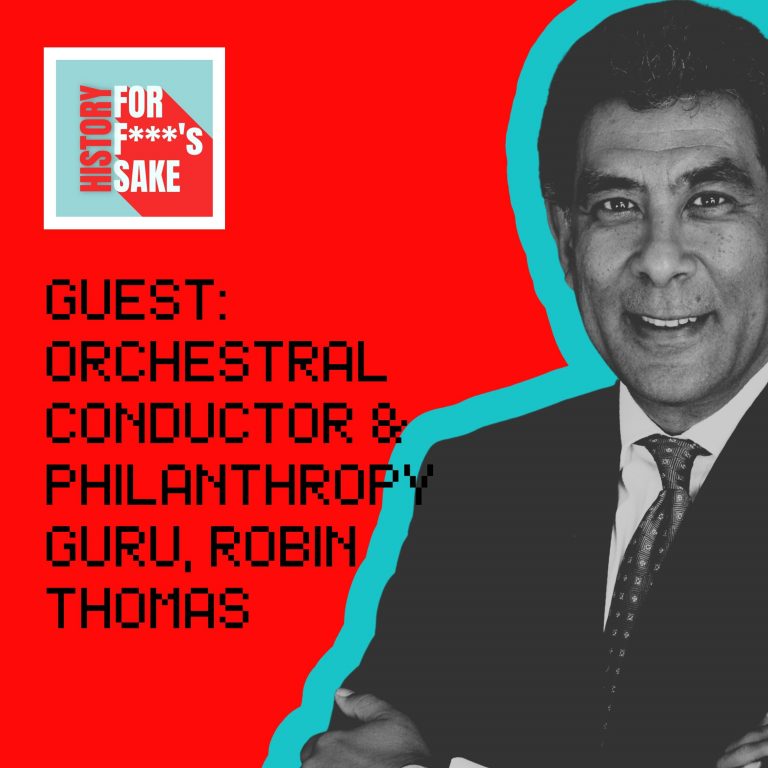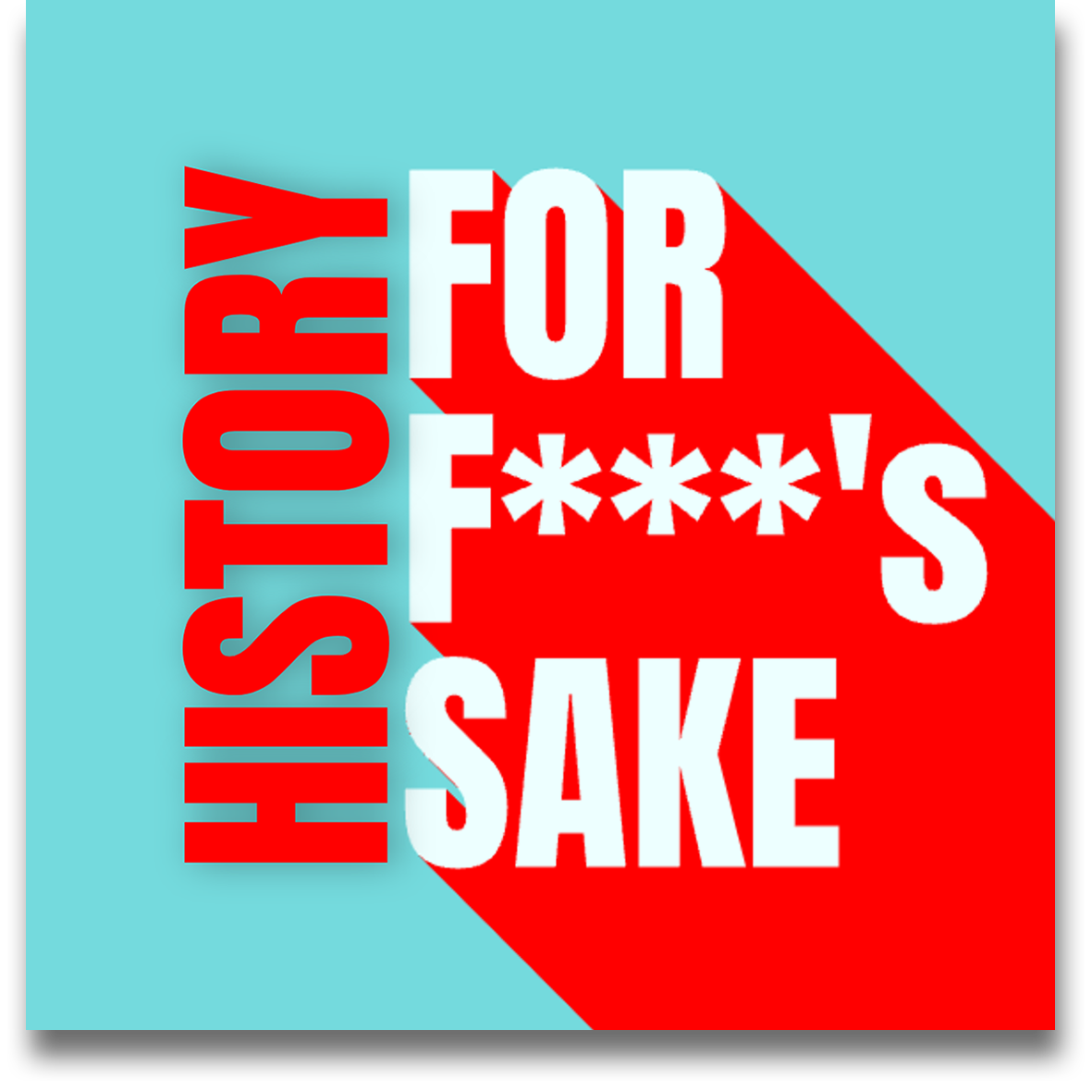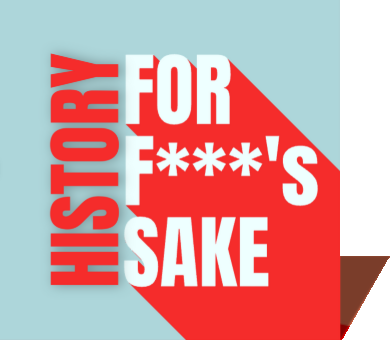
Did you ever wonder how we got here, and how sometimes tiny pieces of history make up, and have shaped our lives?
Or realised how every day, all of us are making history?
Join me, Sarah Dowd, in exploring what has happened in the everyday lives of people for the better, or at least the experiences that have just make us laugh and say…
This is… History. For F***’s Sake, the podcast that explores untold stories that make a difference.
When the world seemingly shut down for almost two years, what were we doing? We were creating art, making history and crying out of human contact. We were craving our culture.
I’m your host, Sarah Dowd, and I have worked on over 200 history, heritage and arts projects in the last 20 years across the world, everywhere from the Imperial War Museum in London to exploring how we put a fleet of ships in the sky, or bringing wrecks back from Honolulu.
I was recently diagnosed with ADHD which has brought a whole new layer of thinking about creativity and how we get people – ALL PEOPLE – really engaged with our shared history and culture.
Stories. Art. Film. Books. Ships. Music. Museums. People. Joy. Experiences. Humour. Humanity.
Because it’s all History, For F***’s Sake.
Find out more at historyffs.com
How do songs help us survive history’s darkest times? Why do joyful melodies so often mask painful truths? In this fascinating episode of History for F***’s Sake host Sarah Dowd is joined by Canadian conductor, music director, and cultural leader Robin Thomas for a deep dive into the musical, historical, and emotional legacy of The Sound of Music.
Sarah and Robin trace the journey of Rodgers & Hammerstein’s classic from Salzburg to Kamloops, exploring why its story of singing nuns, resistance, tyranny, and migration has captivated audiences and helped shape collective memory for generations. Along the way, they reflect on immigrant stories, music as healing and protest, and the power of art to make sense of trauma, displacement, and changing cultural identity. Whether you’re a casual fan humming along or a die-hard who’s done the Salzburg tour, this episode will change the way you experience the von Trapps forever.
Highlights:
- Robin shares his family’s migration story and how The Sound of Music became a personal soundtrack to survival
- Discover why songs stay with us through trauma, immigration, and upheaval, and how musicals like Come From Away and Fiddler on the Roof carry national identity and collective grief
- Why The Sound of Music is more than just singing nuns and pretty mountains and how its story still has relevance
- Robin breaks down the emotional truths that music can convey, even when historic “accuracy” falls short.
- Sarah and Robin debate solitude, togetherness, and what it means to “go deep”
- Why culture, heritage, and the arts are essential and how they form a circle of meaning
- Salzburg bus tours, childhood Walkmans, musical theatre memories, and the permission to embrace being a history and music “nerd.”
About Robin Thomas:
Robin Thomas is an orchestral conductor, musician, and international fundraising professional with over 20 years’ experience in cultural capital campaigns. He has helped organisations across the globe raise hundreds of millions of pounds for transformative heritage, cultural, healthcare, education, and faith projects. Robin has held senior executive and consultancy roles in North America, the UK, and beyond, and was among the first UK professionals to achieve the Certified Fund Raising Executive credential. He has also served on the Board of the Association of Fundraising Consultants.
Connect with Robin:
Facebook: https://www.facebook.com/profile.php?id=100011015072653
LinkedIn:
https://www.linkedin.com/in/robin-thomas-cfre-frsa-1a58b121/
About Sarah Dowd:
I’m Sarah Dowd – writer, speaker, heritage and arts consultant, producer, and all-around nerd – here to share the stories of our past that make us laugh, gasp, and mutter: It’s History… For F***k’s Sake.
For 25+ years I’ve created immersive, inclusive experiences that bring history alive, from rallying Second World War convoys through London to staging performances between Pearly Kings and Gen Z creatives. My work spans museums, cathedral crypts, pop-up theatres, global brands, and community projects across the UK and beyond.
As a Canadian living between the UK and France (with a late ADHD diagnosis that fuels my curiosity and creativity), I zigzag through culture, history, and big ideas, but never boring ones.
Every week on HistoryFFS, we explore how history echoes through today, from Drag Race to prefab tiny houses, with voices from musicians to mischief-makers.
Follow @HistoryFFS – because we’re all making history, one ridiculous, wonderful moment at a time.
Connect with Sarah:
Website:www.historyffs.com
LinkedIn:https://www.linkedin.com/in/sarahdowd/
Patreon: HistoryFFS
YouTube: @HistoryFFSPod
Instagram: @historyFFSPod
TikTok: @historyffspod
Follow the show for new episodes exploring the objects, people, and moments that shaped our world. If you want the story AND the sound of the past, this is essential listening.

What do nuns, Nazis, and a nanny with a penchant for Solfège have to teach us about survival and resistance? Quite a lot, it turns out. On the History For F***k’s Sake podcast, we chat to Canadian conductor and cultural leader Robin Thomas to pull back the curtain on The Sound of Music. But don’t be fooled: this isn’t just a nostalgic singalong, it’s a deep-dive into how music, heritage, and personal memory intertwine, shaping both individual lives and collective history.
Do-Re-Mi, Defiance, and Displacement
The episode opens in 1965, a world reeling from war and stepping gingerly into the Cold War era. Here, The Sound of Music bursts onto the scene, cloaking tough topics in sumptuous melodies. As host, Sarah puts it, “behind the ‘do re mi’ lies a deeper truth. This is a story about survival, resistance, and how we costume our trauma in melody.”
Robin brings a unique perspective, shaped by his South African roots and Canadian upbringing. He describes his own family’s migration from apartheid-era South Africa to Canada, detailing how the arts, especially music provided both escape and connection. For Robin, The Sound of Music is personal: he first encountered the film as a child, its narrative about leaving home to protect family echoing his own family’s story. “It really resonates to this day,” Robin admits, his voice catching with emotion.
Music as Memory, Music as Resistance
Throughout the conversation, Sarah and Robin reflect on how heritage musicals like The Sound of Music use historical backdrops not only for spectacle but for storytelling with substance. Robin argues that the best musical theatre wraps “complicated geopolitical and emotional themes” in “exquisite, timeless tunes.” Even if a musical takes creative liberties, he says, “it doesn’t need to literally be true to be the truth.”
They also touch on the importance of participation in the arts as a means of processing personal and collective trauma. For Robin, conducting and listening to music creates space for introspection and connection within oneself, with others, and across time. He recounts a moving episode conducting Brahms’ German Requiem after the death of his grandmother, describing how music provided “comfort and healing and growing through grief.”
Building Bridges and Busting Myths
Sarah and Robin both take aim at the myth that history and culture exist in separate spheres. Instead, they insist, arts and heritage are constantly shaping one another, forming a story that is “a circle … not two separate spheres.” This point resonates especially through their discussion of migration and how stories like the von Trapp family’s, and the real-life experience of welcoming refugees and immigrants, form threads binding together global communities.
Come From Away, another Canadian musical set against the backdrop of 9/11, gets a loving shoutout as they explore how musical theatre captures “the emotion, the humanity” of historic moments, finding hope in these musical retellings of difficult times.
Connection in a Noisy World
We discuss why connecting through art, honest conversation, and simple acts of being present is so important. Robin laments the pressures of modern life, where “never ending stimuli” make it easy to lose touch with both each other and ourselves. Yet, whether it’s by sitting quietly with music or sharing long, rambling conversations, we both agree on the value of “meaningful discussions … about the meaning of things.”
So next time you hum “Edelweiss” or catch a matinee of The Sound of Music, remember: these songs aren’t just entertainment. They are bridges linking us to the past, to each other, and to the deeper truths that sometimes, only music can reveal.
Listen to the full episode [Link] for more insights, stories, and a bit of joyful nerdiness because our stories (and our songs) really do matter.


